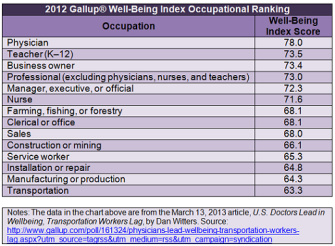The latest findings from the Gallup Poll offer some interesting insight around teacher well-being and the work environment for educators across the country. Based on telephone interviews conducted between January and December 2012 of more than 172,000 people--9,370 of whom identified themselves as K-12 teachers--Gallup found that out of 14 major career categories, teachers rank second in overall well-being, behind only physicians.

As Brandon Busteed, Executive Director of Gallup Education, and Dr. Shane Lopez, Gallup Senior Scientist, note in their recent blog post, “Teaching May Be the Secret to a Good Life,” teachers’ high well-being is related to the fact that they “rate their lives highly and are in great emotional health, which are two key subcomponents of well-being.” Additionally, a high number of teachers surveyed indicated that they “learn or do something new” each day and get to “use their strengths and do what they do best every day.” Teachers also rank sixth behind farmers and fishermen, nurses, physicians, managers, and business owners in workplace engagement, with 31 percent of survey respondents noting that they are “engaged.”
However, despite ranking high in overall well-being, teachers are last (14th), behind truck drivers and coal miners, with regard to the environment their supervisor creates and last when asked if they were “treated with respect all day yesterday.” Educators also report the second highest stress level among the professionals polled.
This information, combined with results of other surveys conducted around teacher engagement, health, outlook, satisfaction, etc., can be helpful in providing K-12 talent managers an overall portrait of educators’ experience. It can also be a useful point of comparison when asking the staff in your organization about their well-being and engagement. Most importantly, we must not only be open to gathering staff feedback, but strong enough to embrace the findings--whether positive or negative--with open arms.
For more information on talent and human capital management in education, you can follow Emily on Twitter: @EmilyDouglasHC